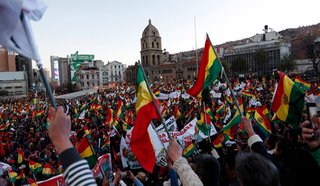Morales called Saturday for urgent, open-ended dialogue with opposition parties holding seats in the National Assembly, but he pointedly excluded the powerful regional civic committees opposing him.
An opposition leader, former president Carlos Mesa, immediately rejected Morales’s gesture, saying, “We have nothing to negotiate with Evo Morales and his government.”
The offer was also rejected by Ruben Costas, the powerful governor of the eastern state of Santa Cruz.
The police rebellion erupted Friday among the elite tactical operations unit known as UTOP in the central city of Cochabamba. It then spread to units in Sucre, the constitutional capital, and Santa Cruz, a bastion of opposition strength in the east.
During the night the rebellion reached other cities but mostly spared La Paz, the country’s administrative capital, local media reported.
But in a worrying sign for the Morales government, the UTOP officers in La Paz who for weeks have closely guarded the central Plaza Murillo — where the presidential palace is located — withdrew to their quarters Saturday in evident solidarity with the protests, an AFP reporter observed.
The sector remained guarded only by a small number of officers.
The police actions erupted amid deadly unrest that has gripped the South American country since Morales was named winner of the October 20 election for a fourth term.
Opposition groups have branded the result a fraud and demanded Morales’s resignation. Three people have died so far and hundreds injured in the unrest.
The leftist president, Bolivia’s first from the indigenous population, assailed the police action. He said Friday on Twitter that “our democracy is at risk from a coup d’etat launched by violent groups undermining the constitutional order.”


